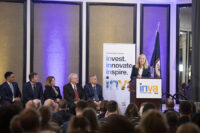State commits $14.5M yearly for new paid internship program
Virginia political, higher education and economic development leaders announced InternshipsVA, a new statewide program to support paid internships.
2025: The year of living disruptively
Looking back on 2025, the best symbol of the past year’s upheaval might be the White House, if not its most famous occupant. Since moving back into 1600 Pennsylvania Ave. in January, our real estate mogul president has launched into a series of home renovations worthy of its own HGTV series. The most prominent changes […]
Spanberger, Earle-Sears speak on right-to-work, talent pipelines
Virginia's gubernatorial candidates discussed business and how to strengthen the state's workforce pipeline.
Virginia falls to No. 4 among CNBC’s top states for business
Virginia lost its spot at the top of CNBC's annual Top States for Business report, the cable business network announced Thursday.
Va. lands back on top in CNBC survey
After downplaying his Democratic predecessor’s consecutive wins in CNBC‘s America’s Top States for Business study, Gov. Glenn Youngkin found himself as Virginia’s top cheerleader on CNBC July 11, playing the commonwealth regained its crown as No. 1. With this year’s win, the state has been named the nation’s top state for business a record six […]
Virginia is CNBC’s Top State for Business for record sixth time
Virginia regained its crown as the No. 1 state in CNBC‘s annual America’s Top States for Business rankings released Thursday, winning the top spot for a record sixth time. The cable business news network once again praised Virginia for having “the nation’s best education system and policies that give companies room — both literally and […]
Virginia rises to No. 2 in CNBC’s Top States for Business
Rated America’s best state for education, Virginia climbed to the No. 2 spot in CNBC‘s 2023 Top States for Business rankings, with North Carolina taking the top spot for the second year in a row. “Virginia is our most decorated state, a five-time winner,” the cable business news network said Tuesday, “but you’ll pay dearly […]
Making the grade
For Virginia Gov. Glenn Youngkin, this is the state’s rebuilding era. Although his Democratic predecessor, Gov. Ralph Northam, trumpeted Virginia’s unprecedented consecutive two-time run as CNBC‘s Top State for Business, Youngkin has been critical of the state missing out to our Southern neighboring states on big manufacturing deals because of Virginia’s dearth of project-r[...]
Breaking rank
What a difference a year makes. On July 13, 2021, against a backdrop of ships blasting their horns and spraying water in celebration at the Port of Virginia’s Norfolk International Terminals, Gov. Ralph Northam sat for a harborside interview with CNBC, which had just named Virginia the nation’s best state for business for an unprecedented […]
Youngkin, CNBC see room for growth in Va.
In July, Virginia ceded the top spot in CNBC‘s America’s Top States for Business rankings to neighboring North Carolina, with Virginia taking third place in the annual list. Virginia had previously held the No. 1 slot for a record-breaking two years — a feat no other state has matched in the coveted award’s 15-year history. […]
Virginia snags “Best Business Climate” state ranking
Virginia is the state with the “Best Business Climate” in the nation, according to Business Facilities magazine’s 17th annual State Ranking Report, released Wednesday. Last year, Texas held the No. 1 spot, with Virginia taking second. After falling off Business Facilities’ top 10 list in 2014 and 2015, Virginia placed ninth in 2016, fourth in […]
Virginia ranked CNBC’s Top State for Business again
Virginia retained its place as CNBC’s Top State for Business this year, beating out North Carolina and Texas and becoming the first state to achieve the honor twice in a row and five times in all, the cable business news channel announced Tuesday morning. Virginia Gov. Ralph Northam appeared live Tuesday morning on CNBC’s “Squawk […]






















